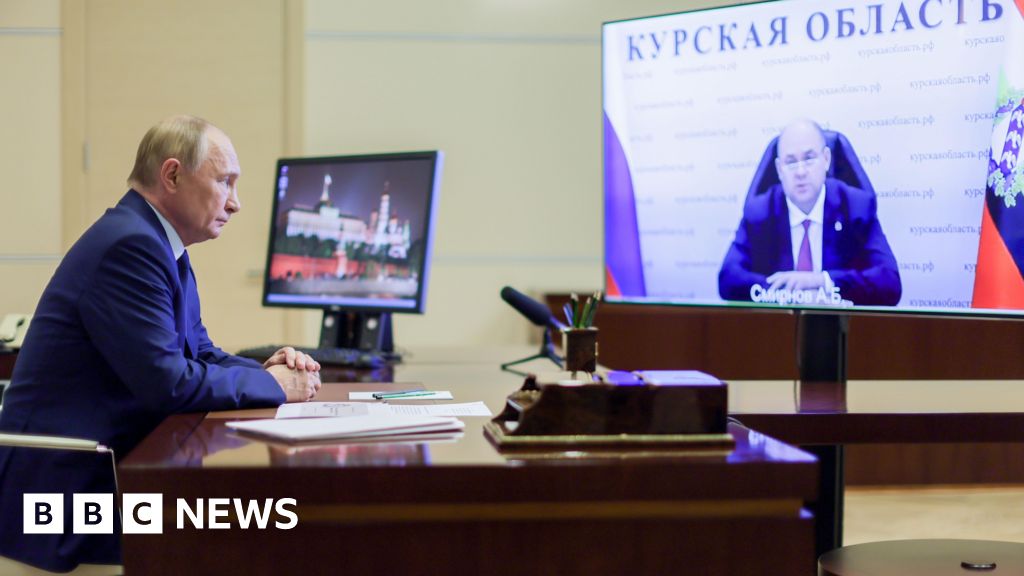
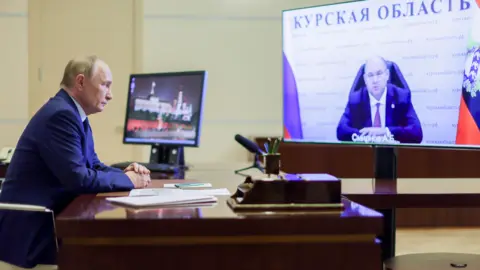 EPA
EPAKursk.
It is one of the first words I wrote and spoke as a BBC correspondent.
In 2000, I reported on the sinking of the Kursk submarine in the icy waters of the Barents Sea. One hundred and eighteen submariners were killed.
Vladimir Putin had been president for less than half a year. I can still remember Russian TV channels slamming him over his handling of the disaster.
This week marked 24 years since K-141 Kursk sank. And, once again, the word Kursk is filling my despatches from Russia. This time Kursk Region, where Ukrainian troops launched their surprise incursion and where they have been seizing territory for nine days now.
Same word.
But Russia 2024 is very different from Russia 2000.
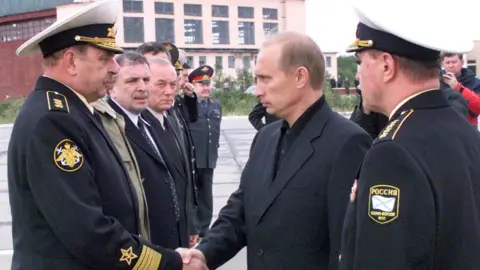 Getty Images
Getty ImagesThis time on Russian TV there is no hint of criticism of President Putin; no casting doubt on his decision-making; no suggestion that it is his invasion of Ukraine that has led to this dramatic moment. Then again, the Kremlin has had a quarter of a century to establish tight control over the Russian media and the messaging.
Even so, will these events damage Vladimir Putin?
It’s a question I’ve been asked many times over the last two-and-a-half years:
- In 2022 when Ukraine sank the warship Moskva, the flagship of Russia’s Black Sea Fleet
- again a few months later after Russian troops’ lightning retreat from north-eastern Ukraine
- and again in 2023 during the Wagner mutiny, when armed mercenaries were marching on Moscow – a direct challenge to Vladimir Putin’s authority.
President Putin got through all of that, apparently unscathed. He will be confident he can overcome this latest challenge.
But here’s the thing. The Wagner mutiny was over in a day.
Ukraine’s offensive inside Russia has been going on for more than a week. The longer it continues, the greater the pressure will be on the Russian leadership and, potentially, the greater the damage to President Putin’s authority.
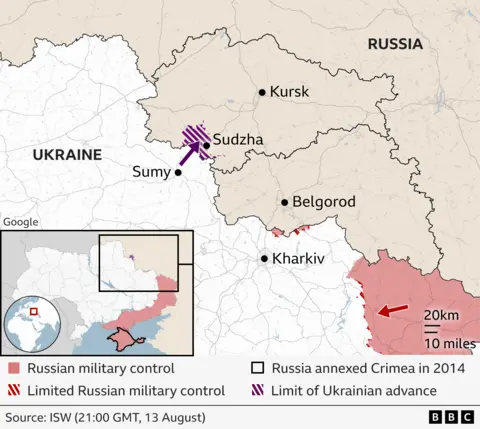
Through his two and a half decades in power, Mr Putin has cultivated the image of “Mr Security“, the only man in this vast country capable of keeping Russians safe and secure.
His so-called “special military operation” (the full-scale invasion of Ukraine) was presented to the Russian people as a way of boosting Russia’s national security.
Two and a half years into this war there isn’t much sign here of “safe and secure”.
There is more Nato on Russia’s borders, with Sweden and Finland having joined the Nato Alliance; Russian towns are coming under regular Ukrainian drone attack; now Ukrainian soldiers are seizing Russian territory.
Through his choice of language, Vladimir Putin is trying to show the Russian public that there is no need to panic.
When referring to the Ukrainian incursion he has avoided using the word “invasion”. Instead, he has spoken of “the situation in the border area” or “the events that are taking place”. The Kremlin leader has also called the Ukrainian offensive “a provocation”.
What will the Russian president do next?
Don’t expect him to pick up the phone and call Kyiv. Russian officials have made it clear that, following the Ukrainian attack, they’re putting the very idea of peace talks on hold.
Not that any large-scale negotiation had been scheduled to take place.
In fact, this week Vladimir Putin leader announced exactly what his intention is: “…to force the enemy from Russian territory.”
It’s one thing saying it. It’s another thing doing it. Despite deploying reinforcements to the Kursk region, the Russian military has yet to regain control in this part of Russia.
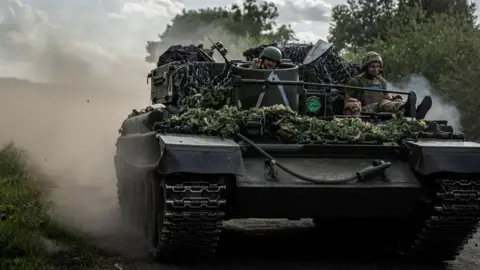 Reuters
ReutersAs I was walking past the Kremlin on Thursday morning, I stopped in my tracks.
As workers were setting up seating and screens for an event, Edith Piaf’s classic Non, je ne regrette rien (No, I regret nothing) was playing on a large video screen and echoing across Red Square.
It was a very surreal moment.
Vladimir Putin has shown no sign of regret for having launched a full-scale invasion of Ukraine.
No regret for the decisions he has taken since.
If his public statements reflect his current state of mind, he still believes there is only one possible outcome of this war: Russia’s victory.

